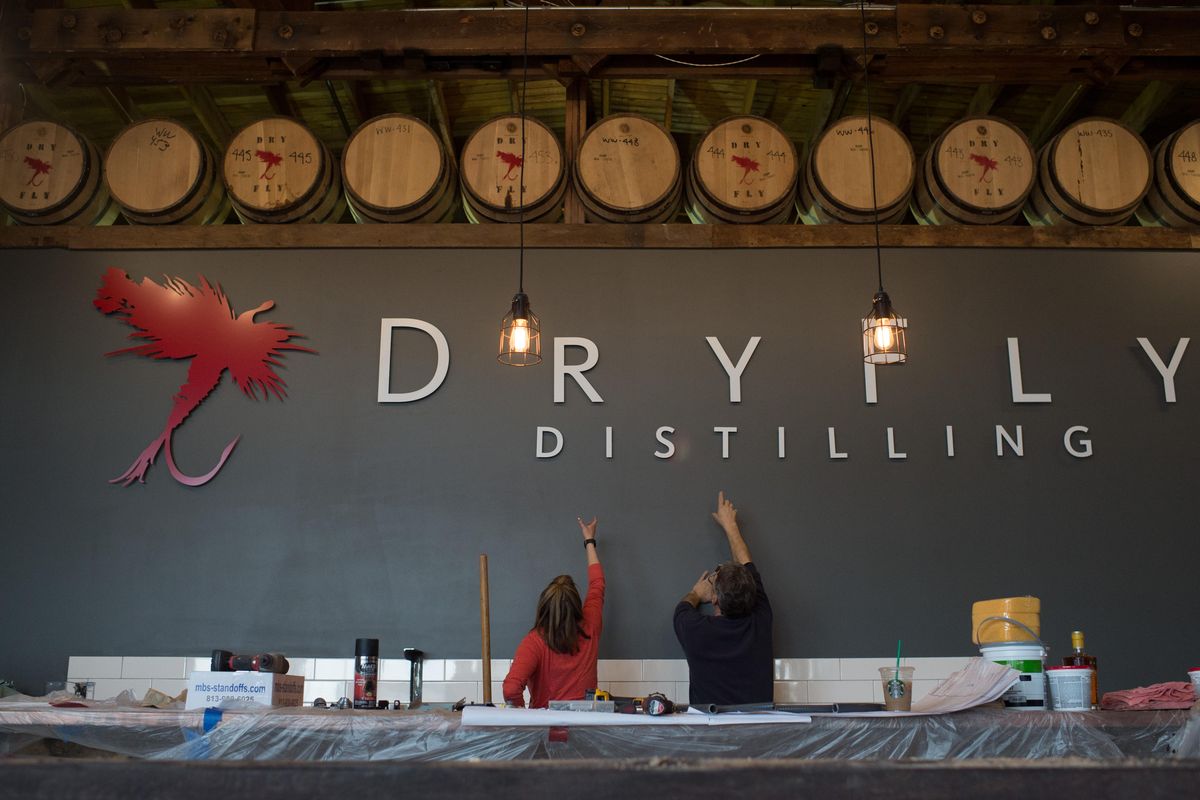New tasting room at Dry Fly Distilling celebrates grain-to-glass journey

Dry Fly Distilling likes to highlight the journey from farm to bottle – the use of grains produced on the Palouse to make its acclaimed gin, vodka, whiskey and bourbon.
That connection to the land is now on display in the Spokane distiller’s new tasting room, set to open Saturday at Dry Fly’s home base near Gonzaga University.
The 130-year-old wood planks wrapping the bar are straight out of a local barn loft. Hardware on the door to the barrel room is fashioned from steel chisel points taken off old plows.
“We used junk, if you will, from the scrap pile and turned it into a thing of beauty,” said Kent Fleischmann, who owns the business with co-founder Don Poffenroth.
They turned over the design and construction of the room to lead distiller Patrick Donovan and his wife, McGraw Donovan.
“Our story is really cool, and we wanted the story for this room to be really cool,” Patrick Donovan said. “All the barn wood that you see is actually from a farmer that we work with, that we do a malt whiskey with.”
Dry Fly will showcase that whiskey in a special barrel tasting Saturday.
Racks holding hundreds of oak barrels in various stages of aging – from a few days to over nine years – are on view through windows to the tasting room.
“The whole idea was to tie our barrel room in with the tasting room,” Donovan said.
Custom-made shelving, tables and benches showcase reclaimed wood saved from on-site demolition.
The 10-year-old distillery, inside the Riverwalk Plaza building along the Spokane River at East Trent Avenue, has had little functional space for greeting visitors and pouring samples of its spirits. The business had looked at moving the entire operation elsewhere in town, but that would have been a costlier solution to the space crunch.
Instead, the owners carved out the 1,200-square-foot tasting room by expanding into a former coffee shop next to the distillery.
“To be able to do this and stay down here was perfect,” Donovan said. “Obviously we have a ton of equipment that we don’t particularly want to move.”
Walk-in business slowed after Washington permitted liquor sales in grocery stores. The new tasting room, with seating for 50, is an invitation to come back to the distillery and learn about spirits at a leisurely pace.
“This is going to allow us to really give people a better experience when they come in,” Donovan said.
Craft distilleries, highly regulated in Washington, are limited to pouring 2 ounces per person per day. But that’s enough, Donovan said, for a visitor to sample a flight of spirits totaling one ounce, plus try a small altered or mixed sample for the second ounce.
“And hopefully grab a bottle and head out the door,” he said.
Dry Fly also has ample room now to hold classes for connoisseurs and those just discovering fine spirits as cocktail culture experiences a resurgence.
“We’re going to start doing cocktail classes, teaching people how to make drinks,” Donovan said. “We’ll do whiskey courses where it’ll be all things whiskey – milling the grain to barrel aging, all of those things. Maybe it will be summer cocktails, maybe fall cocktails, bartending basics – why you shake, why you stir certain times. It should be really fun to get people engaged in that.”
Visitors will be exposed to select cocktail syrups that Dry Fly will sell in its retail store.
Dry Fly also plans to serve some small bites to demonstrate food-pairing possibilities.
“The idea is just to educate the consumer,” Fleischmann said. “There are a lot of good foods that can go with whiskeys and vodkas. They can take it home and make it themselves.”
The tasting room, he added, “is where we’re going to give back to the community and be a better destination for tourism and for our friends who have supported us.”